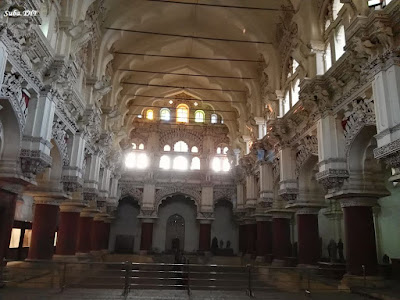I was at Karaikudi recently for the 79th annual Kamban Festival; Kamban authored the immortal Tamil epic Kamba Ramayanam. I was also searching the heirs of the Good Samaritans mentioned in my mother’s autobiography. She was born there; so was I. K.Subashini PhD, the co-founder of the Tamil Heritage Foundation, caught me off guard and commandeered me to spend Quality-Time at Chairman Manicka Vasagam Middle School at Devakottai. That visit was to become a turning point in my life.
I suggested the parents being invited. None came as most were marginalised daily wage-earners. The heritage of the school is interesting. The 86-year old Prince of Devakottai told me that he studied in this very school run by Thiruvengadam Iyengar for the then elite. The family of Mr. Manicka Vasagam, a former chairman of the municipality, donated generously for the school. It is poetic justice that it serves the down-trodden, now. I learnt that this ‘nondescript‘ school thrived on innovations galore.
The day’s events unfolded themselves in an impressive array with military precision. A student hoists the National Flag usually. They yielded that privilege to me formally. A girl of ten compèred the proceedings, like a sergeant-major. All stood at attention, saluted the flag and sang the National Anthem in unison, as to manner born. At her prompting, one student read the day’s news in Tamil, another in English, followed by a report on a refreshingly new science milestone and, much to my delight, a gem of reflective practice on critical thinking. The students reassembled in the hall for the session I was to lead. Instead, I was led.
Prime Minister Modi would have been won over by the hygiene during the midday meal. Each student had a clean plate placed on a serviette; a parent-volunteer ensured smooth service and logged his /her comments. The vibrant Parent-Teachers Association meets in the parents’ humble abodes, in turns, once a month.
I was treated to a special repast of many students presenting their achievements with becoming modesty. Most had more than 15 testimonials. Dhanalakshmi was the record-holder with 46 rewards; both her parents are daily labourers. I did gain the impression that the parents were also receiving guidance on livelihood issues. As Wordsworth put it in 1802, “The Child is father of the Man”.
We opted for a Q & A session. I am driven to give a condensed indirect speech version for ensuring impersonal presentation. I was grilled by probing questions that kept me on my toes for four hours! I had earlier commended their habit of note-taking. A daily re-read of the previous day’s lessons, an analytical study of that day’s lessons and a survey of the next day’s lessons, I said, can avert slogging for the examination. We had an interesting exchange of views about reading as a habit. I had hinted that only death can arrest one’s studious way of life. I was quizzed as to how much I followed my own advice! I suggested their keeping a diary for four years in one page by suitably partitioning it; I said two such diaries will show their intellectual growth in eight years, in a comparable format. This was whole-heartedly welcomed. The Headmaster’s suggestion about my sending a quote and my comments thereon in a single page for display was well-received.
Some samples from the Q & A session:
Parameswari asked me to cite some exemplary decisions by me. I told her about my opting for the Indian Audit & Accounts Service, as it guaranteed statutory autonomy. I also mentioned returning to India, though settled in the United Kingdom, for academic work in Tamil. I had earlier mentioned about two politicians, whom I admired. Jagadeeswaran wished to know more. I told him how Nehru took our objection to the government footing his election expenses in proper perspective; he paid it from his pocket and thanked the ‘ever vigilant’ Accountant General, Madras, handsomely. We had a good laugh as all knew the contemporary aberrations. The other was Mr.Hitendra Desai, the Chief Minister of Gujarat in 1966. I was the Financial Adviser. His advice to me was that I do not have to rationalise consent to proposed expenditure. I was obliged, he said, to cite reasons and suggest alternatives, if I vetoed any proposal. I told the children that this advice stood me in good stead throughout my career. I had mentioned that the Council Libraries welcomed me in Tamil and other languages in the U.K. This led to a spirited discussion on language-learning and they readily accepted that while the mother tongue is a must, a polyglot is better endowed. Karthikeyan wanted me to name the language that attracted me. I mentioned Arabic that excelled in calligraphy, cadence and exact meaning. I mentioned Mr.A.Srinivasaraghavan, the scholar, as my favourite teacher to Raji and confessed to Bharathkumar that I was pressurised by my father to enter the civil service. We had, thanks to Chinnammal, a hilarious discussion on my love for native cricket called kittipull. Karthika floored me by asking about my best friend. I had recently lost Mr. K.R.V.Subramanian, a bosom friend of 65 years. I almost broke down when I recalled that bond.
In sum, we learnt from each other.
The link to Richard Bach’s Jonathan Livingston Seagull is obvious. Jonathan was a metaphor for flying; he flew higher and higher for his love of flying rather than searching for food. I indulged in a hurried story-telling session on ambition with Jonathan as the model. The children were transfixed with wonderment. I intend a follow-on session.
Good news travels fast, like the Olympian’s javelin throw. I addressed my service colleagues on this School, on April 15. They were transfixed no less and some shared similar stories.
India will be transformed only through such schools. I hope this appeals to the readers of Confluence.
























